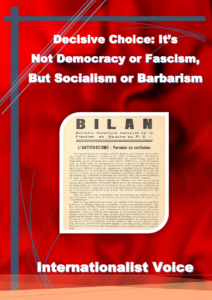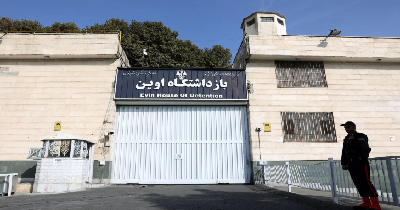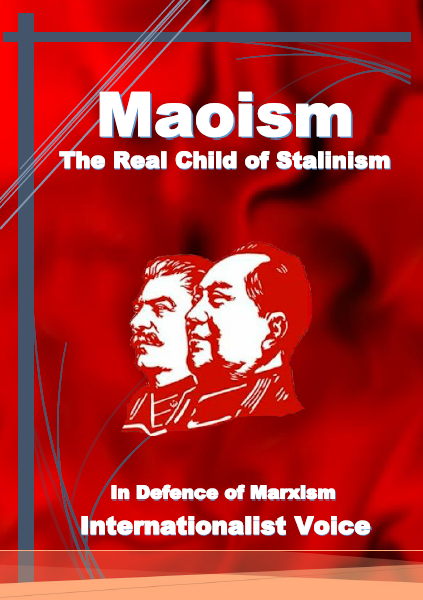Decisive Choice: It’s Not Democracy or Fascism, But Socialism or Barbarism
“Anti-fascism is the worst product of fascism.”[1]
Trump’s re-election in the US and the rise of populism and far-right movements in other countries have once again highlighted the threat of fascism and the spread of far-right ideologies. From the perspective of democrats and leftists, the emergence and spread of populism is not a result of the specific conditions of capitalism, but rather the outcome of the rise of dictators. From our point of view, fascism is a product of the historical failure of the working class. Although fascism is not currently on the agenda of global capitalism, this does not mean that global capitalism poses no serious dangers to the working class.
It is not only leftists who regard Trump as a fascist; a significant number of members of the US ruling class, including within the Republican Party, have also labelled him as such. In an interview with CNN, Kamala Harris referred to Trump as a fascist and stated, “[that many people care about] not having a president of the United States who admires dictators and is a fascist.”[2] Additionally, Barack Obama, the former US President, referred to Trump as a fascist during the 2016 presidential election.[3] However, perhaps the most notable instance is the statement made by retired US Marine Corps General John Kelly, a Republican, who served as Secretary of Homeland Security and later as White House Chief of Staff during Trump’s first term. John Kelly claims that Trump praised Hitler during that period. By applying a general definition of fascism, Kelly considers Trump to be a fascist.[4] In all these instances, one common thread is evident: the reduction of fascism to the personal characteristics of a dictator, when, in fact, this phenomenon is rooted in specific conditions of capitalist transformations.
Both dictatorship and democracy are superstructures of the capitalist system, and capital, depending on its needs, can choose and implement one of these forms. In response to historical and economic necessities, capitalism may, at times, lead to democracy, and at other times, to dictatorship. In the heart of Europe, the conditions of the 1930s compelled capital in Germany to adopt a democratic form. However, by the late 1930s and early 1940s, capital saw dictatorship as a necessity and embraced this form. After the 1940s, the situation shifted once again, and capital moved towards embracing democracy.
An important point that both right and left factions of capital use to mislead the public is the claim that fascism established its dominance solely through repression and force. In reality, proponents of capitalism—whether in Germany, Italy, Spain, Portugal, Chile, or elsewhere—first employed democratic mechanisms, often with the support of leftist forces and anti-worker unions, to pave the way for the defeat of the working class (proletariat) and the creation of the conditions for a capitalist dictatorship. Once the proletariat was weakened and defeated, capital easily assumed a dictatorial form, enabling it to sustain its brutal and repressive rule.
Fascism was able to seize political power only through the historical defeat of the working class. In other words, social democracy, by suppressing workers’ struggles after World War I, and later during Stalinism in the 1920s, and by crushing revolutionary proletarian movements, laid the groundwork for the rise of fascism. In the heart of Europe, in Germany, during the suppression of the German Revolution, approximately 20,000 workers and revolutionaries were killed by democratic forces to pave the way for the rise of Nazism. Without this massacre, which marked the historic defeat of the proletariat, the emergence of Nazism would not have been possible.
In 1922, when Nazism was still not widely known in Germany, Emil Julius Gumbel—who was neither a communist nor a revolutionary, but rather a supporter of the bourgeois republic established in Weimar—published a book titled Four Years of Political Murder, in which he exposed organized massacres.[5] A striking aspect of Gumbel’s account is his observation that ideologues and journalists first shaped public opinion to legitimize the killings, after which the repressive state apparatus executed the final stage of the process.
Contrary to the deceptive narratives of Trotskyists, Stalinists, anarchists, and democrats, brutality and savagery are not exclusive to fascism and fascist regimes. Rather, they are inherent to a decaying capitalism, where violence becomes systematic, mechanized, and industrialized. The democratic bourgeoisie is no less criminal than the fascists. The atomic bombings of Hiroshima and Nagasaki, the ruthless bombings of Hamburg and Dresden, and the state terrorism perpetrated by democratic regimes and Stalinists were no less barbaric than the atrocities of fascism. The total destruction of Gaza and the massacre of tens of thousands would have been impossible without the backing of American and European democrats. The number of Black people massacred by the supposedly civilized and democratic governments of Britain and the US rivals the number of Jewish victims under Nazi rule.
Fascism and anti-fascism share a common origin, despite the latter’s pretence of striving for democracy. In other words, anti-fascism serves to strengthen the democratic institutions of capitalism, thereby bolstering the democratic state of capital and, in turn, poisoning the working class with anti-fascist ideology.
The theory of anti-fascism was one of the most potent ideological tools used to sow confusion within the working class and drag it into the Second Imperialist War. Unlike anarchists, Stalinists, and Trotskyists, the position of the communist left during the Spanish events (1936–1939) was one of non-participation in the defence of the Spanish Republic. They argued that the war in Spain was not a civil war but an imperialist war, in which the working class was being sacrificed. The Spanish war provided an opportunity for Stalinists, Trotskyists, and anarchists to practise fighting alongside the democrats, preparing themselves for a patriotic war under the imperialist alliance of Britain, Russia, and the US. The communist left believed that anti-fascism was simply a formula for creating confusion, ultimately leading to disarray in the proletarian position and the definitive defeat of the working class.
The various factions of capital, particularly the left political apparatus of the left of capital, attempt to obscure the political terrorism of neo-Nazis and neo-fascists by reducing them to mere criminal gangs. In so doing, they aim to equate their crimes with those of ordinary criminal gangs, thus portraying the criminal activities of neo-fascist factions as something separate from the inherent barbarism of capitalism. Simultaneously, they call for the democratic institutions of capital to declare such groups illegal. In reality, they ignore the role the capitalist system plays in generating both these acts of violence and the criminal gangs themselves. This approach ultimately lends further legitimacy to the law of capital and calls on the state to act as the guardian of democracy. By so doing, they effectively conceal the fact that political terrorism is a response to the inherent crises and internal competitions within capitalism. From gangster democrats to the savage bourgeoisie in Iran, Turkey, Russia, and other countries, all are complicit in nurturing and supporting such groups for their own benefit. The existence of the capitalist state provides the foundation for the existence of such groups.
In capitalist countries, pressure groups of capital take various forms depending on the political structure of each nation. In Iran, groups such as the plainclothes men[6] and Ansar Hezbollah act as the informal arm of repression, while in Turkey, the Bozkurtlar (Grey Wolves) serve a similar role, and in Russia, extremist nationalists like the Nashists or Cossacks carry out the same function. In countries with parliamentary democracies, these groups are often labelled as patriotic democrats, neo-Nazis, or fascists. Just as groups like the plainclothes men or Ansar Hezbollah cannot exist without the Islamic Republic, the Grey Wolves in Turkey would not survive without the bourgeoisie of that country, and the Nashists or Cossacks could not persist without the support of the Russian state. Similarly, without the existence of the democratic bourgeoisie (the barbarism of capitalism), neo-Nazi groups could not emerge. This is because the state is not neutral, it is a class institution, and the democratic, parliamentary state is essentially just the democratic dictatorship of capital. Therefore, any support for strengthening the democratic state actually strengthens the class war of capital against workers. Anti-fascism, even in its radical forms, can only serve to reinforce bourgeois democracy. Today, the political apparatus of the left of capital, by creating confusion under the guise of anti-fascism, is, in reality, working to preserve the enduring and unyielding fascism that is capitalism.
With this in mind, it is crucial to distinguish between fascism and populism. The rise of populism is not unique to the US; this trend is evident worldwide, from metropolitan capitalism to peripheral capitalism. In fact, populism in Europe is not only as prevalent as it is in the US, it may even be more widespread. Similarly, populism continues to expand within peripheral capitalist systems.
The global working class has not yet faced a definitive historical defeat. Therefore, the rise of populism reflects both capital’s reaction to its own crisis and the retreat of the working class from its previous position on the global stage. Although in recent years the working class has shown signs of awakening and re-engaging in struggle, class struggle at the global level remains largely defensive. The working class has yet to reclaim its position following the propaganda campaigns that facilitated the defeat of Stalinism. A major factor behind this condition has been the ideological corruption of the working class through the “ideology of democracy”—a construct actively shaped and sustained by both state and non-state ideologues of capital.
The rise of populism poses significant challenges to the working-class struggle. Extreme nationalism scapegoats migrant workers as the cause of unemployment among native workers and blames immigrants for social problems. Its policies prioritize the expulsion of migrants while urging workers to defend the nation and align themselves with national capital. This strategy deepens divisions within the working class, fostering fragmentation and undermining class solidarity. The working class must build the capacity to confront these challenges, actively respond to these divisive narratives, and preserve and strengthen class unity in the face of bourgeois attacks.
One of Trump’s populist strategies has been his promise to secure jobs for American workers and restore lost employment opportunities to the United States—a pledge he continues to make. Some anti-worker trade unions have also endorsed this claim. During his first term, Trump sought to bring jobs back to the US by initiating a trade war, imposing heavy tariffs on foreign goods and investments, and expelling migrant workers—an approach he has resumed. He attributed job losses to the presence of migrant workers and the outsourcing of industries, despite the fact that unemployment is a structural issue inherent to the capitalist system, not merely a result of migration or offshoring.
Overall, Trump’s tariff policies during his first term had a limited effect on bringing jobs back to the United States. While some industries benefitted from these measures, many other sectors of the economy were adversely affected. The reduction in the unemployment rate during this period was primarily driven by broader economic growth prior to the outbreak of the COVID-19 pandemic and cannot be solely attributed to Trump’s trade policies.
Trump presents himself as a peacemaker, claiming to have brought peace to the Middle East and to be working towards ending the war in Ukraine.[7] However, we will likely see an escalation of imperialist tensions, not because Trump is an unpredictable and unstable figure whose actions are difficult to anticipate, but because, firstly, these tensions are a product of decaying capitalism, and secondly, in a period of capitalist decline, such tensions take on a more destructive character. Nevertheless, it is important to note that, dialectically speaking, while imperialist tensions will inevitably arise, the bourgeoisie will unite in its attack on the working class, putting aside its internal divisions.
The crisis within the camp of capital has created the conditions for the emergence of the populist trend as a potential solution to escape this crisis. The rise of this trend has only been possible due to the retreat of the working class from its previous positions. Anti-fascism is one of the most lethal poisons used to contaminate the working class, as it ultimately serves only to reinforce bourgeois democracy and restore its power. In the current situation, internationalists bear a heavy responsibility: to defend the class independence of the working class in the class struggle. In response to the capitalist crisis, the working class’s answer must come from its class position and through its specific, real demands. Undoubtedly, the working class’s struggle will begin with the defence of its living standards and, in time, will challenge bourgeois policies. As this struggle evolves, the working class will be able to confront the capitalist order and ultimately dismantle it. Only the global working class, through internationalist struggle and the articulation of its demands in the form of a communist revolution, can put an end to this vicious cycle and create a new future for humanity.
Internationalist Voice
11 February 2025
Notes:
[1] Bordiga
[5] Vier Jahre politischer Mord.
[6] In Iran, plainclothes men refer to unofficial forces, often affiliated with security agencies, who operate without a uniform and play a role in suppressing protests, controlling gatherings, and enforcing government pressure.
[7]During a meeting at the White House with Benjamin Netanyahu, the Prime Minister of Israel, Donald Trump spoke to reporters about his eligibility for the Nobel Peace Prize. He stated that he believes he deserves the award, but at the same time, he feels it will never be awarded to him, which he finds regrettable. Trump then told the reporters:
“They will never give me a Nobel Peace Prize. I deserve it but they will never give it to me.”















